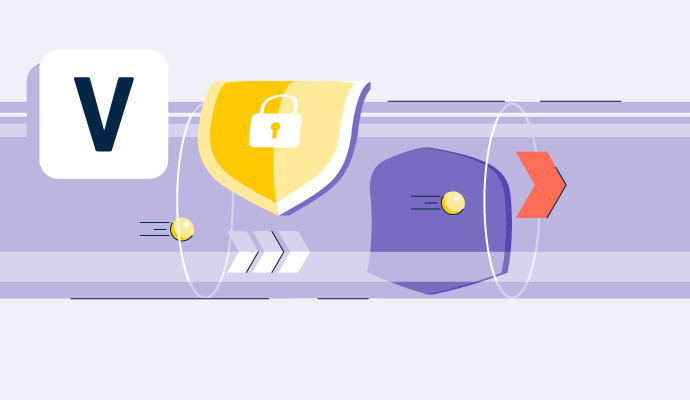Qu'est-ce qu'un réseau privé virtuel ?
Un réseau privé virtuel (VPN) est un service qui fournit une connexion chiffrée d'un appareil à un réseau via Internet. Les VPN masquent l'identité en ligne d'un utilisateur, rendant plus difficile pour les tiers de suivre les activités en ligne et de voler des données. Bien qu'ils soient largement utilisés dans les réseaux d'entreprise, ils sont également utiles pour protéger les informations personnelles dans les environnements Wi-Fi publics.
Les réseaux privés virtuels sont largement utilisés par les entreprises et permettent la transmission de données. Les entreprises utilisent des logiciels de réseau privé virtuel pour fournir aux employés un accès sécurisé, chiffré et à distance au réseau interne de l'entreprise.
Ce logiciel permet aux employés d'accéder aux applications, fichiers, imprimantes et autres ressources de l'entreprise sur le réseau de l'entreprise comme s'ils étaient physiquement au bureau. L'application d'un chiffrement fort à tout le trafic entrant et sortant garantit qu'aucun tiers ne peut accéder aux informations confidentielles.
Types de réseaux privés virtuels
Il existe de nombreux types de réseaux privés virtuels. Cependant, les deux principaux types sont :
- VPN d'accès à distance est de type ordinateur-à-réseau. Il permet aux utilisateurs de se connecter au réseau de l'entreprise depuis n'importe où, rendant le travail à distance plus sûr et plus accessible. Ce type de VPN est idéal pour un usage personnel ; cependant, il peut être inadapté pour les grandes entreprises.
- VPN site-à-site est couramment utilisé par les entreprises, en particulier les grandes entreprises avec plusieurs succursales. Utiliser des VPN site-à-site pour connecter les bureaux d'entreprise aux bureaux de succursale est le moyen le plus efficace d'assurer une communication sécurisée au sein et entre les grands départements. Plusieurs utilisateurs à divers endroits peuvent accéder aux ressources des uns et des autres.
Comment fonctionne un réseau privé virtuel ?
Un VPN cache les adresses IP des utilisateurs en les redirigeant via un serveur distant spécifiquement configuré par un hôte VPN. Étant donné que le trafic est chiffré entre l'appareil et le réseau, le fournisseur d'accès Internet (FAI) et d'autres tiers ne peuvent pas voir quelles données un utilisateur envoie et reçoit – elles restent privées.
Les VPN permettent aux employés de travailler en dehors du bureau physique et de se connecter en toute sécurité au réseau de l'entreprise avec des ordinateurs portables, des smartphones et des tablettes.
Avantages d'un réseau privé virtuel
L'utilisation de VPN aide les utilisateurs à se protéger contre les pirates et les cybercriminels car les données sont protégées et ne peuvent pas être déchiffrées. Les autres avantages d'un réseau privé virtuel incluent :
- Utilisation sécurisée du Wi-Fi public : Bien que pratique, l'utilisation du Wi-Fi public dans des lieux comme les aéroports ou les cafés comporte le risque que quelqu'un puisse suivre l'activité en ligne. Les VPN aident à protéger les données personnelles et à cacher l'historique de navigation des pirates potentiels.
- Confidentialité des données vis-à-vis des FAI : Bien que les utilisateurs soient plus en sécurité en utilisant leur Wi-Fi domestique par rapport à une connexion publique, leurs informations ne sont pas entièrement protégées. Les FAI comme Comcast et Spectrum peuvent accéder aux données Internet et aux habitudes de navigation des utilisateurs. Cependant, les VPN aident à masquer les adresses IP des utilisateurs de leurs FAI.
- Protection des données personnelles contre les applications en ligne : De nombreuses applications en ligne ont été exposées pour avoir collecté et vendu des données d'utilisateurs. Par conséquent, l'utilisation d'un VPN empêche les applications d'associer le comportement d'un utilisateur à une adresse IP et peut également limiter le suivi de l'historique de navigation et de la localisation.
- Chiffrement sécurisé : Les VPN permettent une sécurité maximale sur les réseaux publics et privés. Les informations sont chiffrées et presque impossibles à déchiffrer.
- Dissimule la localisation de l'utilisateur : Étant donné que les données de localisation démographique proviennent d'un autre pays, les tiers ne peuvent pas déterminer la localisation réelle d'un utilisateur. De plus, la plupart des VPN ne stockent pas les données des activités des utilisateurs, laissant le comportement des utilisateurs complètement caché.
- Transfert de données sécurisé : Les utilisateurs travaillant à distance ont généralement besoin d'accéder et de partager des fichiers confidentiels sur le réseau de l'entreprise. Pour accéder au réseau, les entreprises exigent souvent des VPN pour garantir que la connexion est sécurisée et empêcher les fuites de données.

Amanda Hahn-Peters
Amanda Hahn-Peters is a freelance copywriter for G2. Born and raised in Florida, she graduated from Florida State University with a concentration in Mass Media Studies. When she’s not writing, you’ll find Amanda coaching triathletes, cuddling up with a good book, or at the theater catching the latest musical.


















